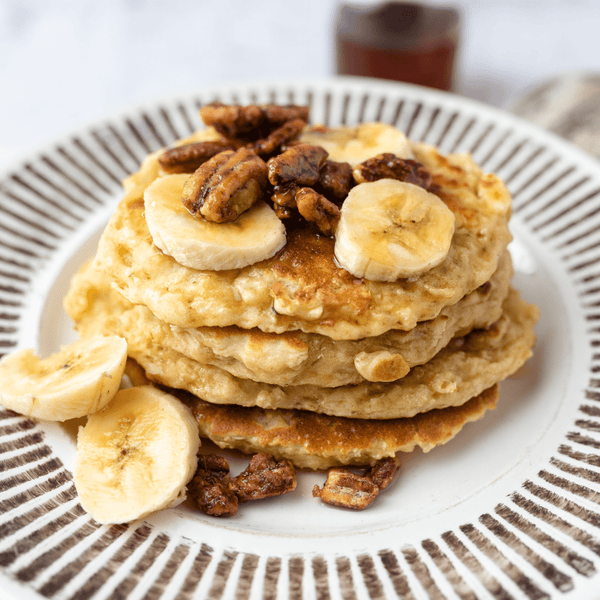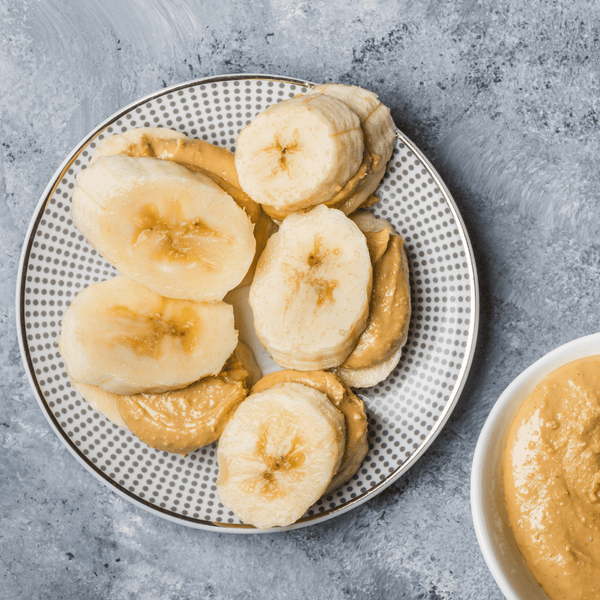Protein Bars Before Bed: Benefits and Risks of Pre-Sleep Snacking
Snacking before bed has long been a topic of debate. While some say that late-night eating is unhealthy, others believe that what you eat matters more than when you eat.
There are also many fitness enthusiasts who argue that high-protein snacks like a protein bar before bed can be beneficial, especially when it comes to muscle recovery. However, there are potential downsides to consider, such as digestive issues or excess calorie intake.
Ultimately, the question boils down to more than just a simple "yes" or "no."
Which is why, we’ll explore the scientific benefits and risks of eating protein bars before bed, the type of bars you should choose, and what the latest research says about how pre-sleep snacking affects your body.
Let’s get started! If you're looking for other nighttime snacking options, explore our guide to the best snacks before bed for better sleep and recovery.
Is It Okay to Eat a Protein Bar Before Bed?
Before learning whether a protein bar is a good pre-sleep snack, it’s essential to understand what happens to our muscles during sleep. While we rest, our bodies aren’t just shutting down. In fact, sleep is a highly active time for recovery, repair, and regeneration- especially when it comes to muscle tissue.

How Sleep Supports Muscle Repair
Throughout the day, our muscles experience tiny amounts of wear and tear, especially if we’re active or working out. When we sleep, our body goes to work repairing and rebuilding these muscles. This process, called muscle recovery, is essential for muscle growth and strength.
However, since we’re not eating during sleep, our body can run out of fuel and begin breaking down muscle tissue for energy. This is why some experts believe that eating protein before bed can help prevent this muscle breakdown by giving our body the amino acids it needs to repair muscles overnight. Understanding when to consume protein is crucial for optimal results—learn more about protein bar timing before or after workout to maximize your fitness gains.
A protein bar with the right ingredients could help with this. Thus, eating a protein bar before bed can be perfectly fine, but it depends on your goals, body needs, and most importantly, the type of protein bar you choose.
Here, it becomes important to remember that not all protein bars are created equal.
What Science Says About Protein Before Bed
Several studies have explored the effects of consuming protein before bed. The majority of them have found pre-bed-time protein to be beneficial.
A key study published in the Journal of Physical Activity and Nutrition found that ingesting protein (particularly casein) before bed increased overnight muscle protein synthesis in young men. This supports the idea that pre-sleep protein can aid in muscle recovery and growth.
Another study published in Frontiers in Nutrition found that nighttime protein intake does not impair fat metabolism or cause weight gain, as long as total daily calorie intake is controlled.
These findings suggest that eating a good-quality protein bar before bed can be beneficial, especially for individuals looking to improve muscle recovery, without negative impacts on fat storage or weight gain. For those focused on building muscle, discover how much protein you need to build muscle effectively and optimize your nutrition strategy.
Potential Downsides of Eating Protein Bars Before Bed

I eat a protein bar before bed, what are the negatives of it?
Eating a protein bar before bed can promote fullness, prevent unhealthy night time snacking and help in muscle repair, besides other things.
However, it is important to not overlook the risks involved. Depending on factors like the bar’s ingredients, your personal metabolism, and health goals, some individuals might face one or more of the following issues:
1. Digestive Discomfort
Some protein bars contain ingredients like sugar alcohols and artificial sweeteners, which can cause bloating, gas, and other gut issues, since these ingredients are harder for the body to break down. If you’re prone to digestive issues, it’s best to choose a protein bar with simple, clean ingredients. Supporting your digestive health is essential—read our article on best foods for gut health and explore our gut-healthy snacks collection for better digestion.
2. Excess Calorie Intake
Eating anything before bed, including protein bars, adds to your daily calorie intake. If you're not mindful, this could lead to weight gain over time. If you're not exercising or burning enough calories throughout the day, even a healthy protein bar may push you into a calorie surplus. This is especially important for people who are trying to lose weight or maintain a calorie deficit. Not sure how many calories you should be consuming? Check out our guide on how many calories should I eat per day to find your ideal intake, and learn about calorie deficit tips for women for sustainable weight loss.
3. Potential Impact on Sleep
While protein itself doesn't generally interfere with sleep, some protein bars contain caffeine, sugar, or other stimulants that can keep you awake. Eating a bar with added sugars can lead to a spike in blood sugar levels, which may make it harder to fall asleep or lead to restless sleep. Always check the ingredients list to avoid stimulants in your bedtime snack. Choosing the right snacks can also help manage cravings—discover effective strategies in our article on how to suppress appetite naturally.
How to Choose the Right Protein Bar for Nighttime Snacking
In order to avoid all the problems listed above, it is best to spend some time finding a protein bar with clean, gut-friendly ingredients. Here’s what to look for:
- Low in Sugar: Excess sugar can disrupt sleep and lead to weight gain. Go for bars with no added sugars or artificial sweeteners.
- High-Quality Protein: Look for bars that contain high-quality protein sources, such as whey, casein, or plant-based proteins like pea or hemp.
- Avoid Stimulants: Some protein bars contain caffeine, green tea extract, or other stimulants that can interfere with your sleep. Be sure to check for these and avoid them.
- Natural Ingredients: Choose protein bars with minimal, natural ingredients. Avoid bars with artificial additives, preservatives, or excessive fillers.
- Moderate Calories: If you’re concerned about weight gain, choose low calorie protein bars, ideally between 100-200 calories. If you're specifically looking for weight loss support, don't miss our comprehensive guide on the best protein bars for weight loss with expert recommendations.
Try 100 Cal Snacks Protein Bars for a Healthy Pre-Sleep Snack

Now that we’ve explored how to choose the right protein bar, you might be asking yourself, “What’s the best option for me?” or “How do I find a protein bar that truly meets my needs?”
The answer is simple: look no further than the Peanut Butter Protein Bars and Chocolate Protein Bars from 100 Cal Snacks! With these delicious options, you can enjoy a nutritious pre-sleep snack without any worries.
Our high protein snacks under 100 calories are made with 100% natural, non-GMO ingredients, and they contain no added sugars, sugar alcohols, or artificial additives. Want to learn more about our star ingredient? Read about ashwagandha benefits and how long it takes for ashwagandha to work for stress relief and better sleep. Plus, they come with a host of benefits:
- Vegan and made from wholesome ingredients
- Low in calories, with just 100 calories per bar!
- Packed with high-quality protein, perfect for muscle recovery
- Infused with superfood adaptogens like ashwagandha to promote relaxation and reduce stress, making them ideal for nighttime consumption
- Gluten-free, so they’re gentle on your digestive system
- Keto-friendly, with less than 3g net carbs
Browse our complete collections: protein bars, keto snacks, vegan snacks, gluten-free snacks, and low-carb snacks to find your perfect match.
Unlike many other protein bars, our 100 Cal Snacks protein bars are meticulously tested to ensure great taste and texture, meaning you won’t have to deal with that bitter aftertaste often found in other products.
So, what are you waiting for? Treat yourself to our deliciously wholesome snack bars today and let them work their magic while you sleep!
FAQs
Does protein burn fat at night?
While protein itself doesn’t directly burn fat, it plays a major role in muscle repair and growth during the night. More muscle can lead to a higher metabolism, which helps your body burn more calories over time, even while you sleep. To support your muscle-building goals, check out our guide on high-protein dinner ideas and high-protein lunch options for complete daily nutrition.
Will I gain weight if I eat protein bars at night?
Not necessarily. Weight gain occurs when you consume more calories than your body needs. If eating a protein bar at night fits into your daily calorie goals, it shouldn’t lead to weight gain. Just make sure to choose a healthy option and keep portion sizes in check! For more weight management insights, explore our articles on healthy snacks for weight loss and low-calorie snacks for weight loss to stay on track with your goals.
Is it okay to eat a protein bar right before bed?
Yes, eating a protein bar before bed can be beneficial, especially if it’s made with high-quality ingredients. It can help support muscle recovery overnight, as long as you choose a bar that’s low in sugar and doesn’t contain stimulants.
Whether you're snacking late at night or looking for healthy options throughout the day, 100 Cal Snacks has you covered. Explore our guides on midnight snacks, best late-night snacks, and evening snacks for more smart snacking strategies.








